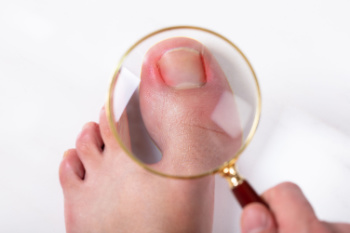
Ingrown toenails account for a significant portion of foot problems, accounting for approximately 20 percent of cases. This condition occurs when the edge of a toenail grows into the surrounding skin, causing pain, swelling, and sometimes infection. Common causes include improper nail trimming, wearing tight shoes, and genetic predisposition. Relief techniques focus on reducing discomfort and preventing further issues. Soaking the affected foot in warm, soapy water can soften the skin and nails, providing temporary relief. Wearing properly fitting shoes with ample toe room and trimming nails straight across, rather than in a curved shape, may help to prevent ingrown toenails. If you have developed this condition, it is strongly suggested that you visit a podiatrist who can successfully treat ingrown toenails, which may include minor surgery for removal.
Ingrown toenails may initially present themselves as a minor discomfort, but they may progress into an infection in the skin without proper treatment. For more information about ingrown toenails, contact one of our podiatrists of Foot and Ankle Center. Our doctors can provide the care you need to keep you pain-free and on your feet.
Ingrown Toenails
Ingrown toenails are caused when the corner or side of a toenail grows into the soft flesh surrounding it. They often result in redness, swelling, pain, and in some cases, infection. This condition typically affects the big toe and may recur if it is not treated properly.
Causes
- Improper toenail trimming
- Genetics
- Improper shoe fitting
- Injury from pedicures or nail picking
- Abnormal gait
- Poor hygiene
You are more likely to develop an ingrown toenail if you are obese, have diabetes, arthritis, or have any fungal infection in your nails. Additionally, people who have foot or toe deformities are at a higher risk of developing an ingrown toenail.
Symptoms
Some symptoms of ingrown toenails are redness, swelling, and pain. In rare cases, there may be a yellowish drainage coming from the nail.
Treatment
Ignoring an ingrown toenail can have serious complications. Infections of the nail border can progress to a deeper soft-tissue infection, which can then turn into a bone infection. You should always speak with your podiatrist if you suspect you have an ingrown toenail, especially if you have diabetes or poor circulation.
If you have any questions, please feel free to contact our office located in Egg Harbor Township, NJ . We offer the newest diagnostic and treatment technologies for all your foot care needs.
